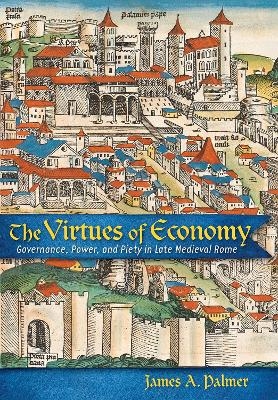
The Virtues of Economy
Governance, Power, and Piety in Late Medieval Rome
Seiten
2019
Cornell University Press (Verlag)
978-1-5017-4237-8 (ISBN)
Cornell University Press (Verlag)
978-1-5017-4237-8 (ISBN)
The humanist perception of fourteenth-century Rome as a slumbering ruin awaiting the Renaissance and the return of papal power has cast a long shadow on the historiography of the city. Challenging this view, James A. Palmer argues that Roman political culture underwent dramatic changes in the late Middle Ages, with profound and lasting...
The humanist perception of fourteenth-century Rome as a slumbering ruin awaiting the Renaissance and the return of papal power has cast a long shadow on the historiography of the city. Challenging this view, James A. Palmer argues that Roman political culture underwent dramatic changes in the late Middle Ages, with profound and lasting implications for city's subsequent development. The Virtues of Economy examines the transformation of Rome's governing elites as a result of changes in the city's economic, political, and spiritual landscape.
Palmer explores this shift through the history of Roman political society, its identity as an urban commune, and its once-and-future role as the spiritual capital of Latin Christendom. Tracing the contours of everyday Roman politics, The Virtues of Economy reframes the reestablishment of papal sovereignty in Rome as the product of synergy between papal ambitions and local political culture. More broadly, Palmer emphasizes Rome's distinct role in evolution of medieval Italy's city-communes.
The humanist perception of fourteenth-century Rome as a slumbering ruin awaiting the Renaissance and the return of papal power has cast a long shadow on the historiography of the city. Challenging this view, James A. Palmer argues that Roman political culture underwent dramatic changes in the late Middle Ages, with profound and lasting implications for city's subsequent development. The Virtues of Economy examines the transformation of Rome's governing elites as a result of changes in the city's economic, political, and spiritual landscape.
Palmer explores this shift through the history of Roman political society, its identity as an urban commune, and its once-and-future role as the spiritual capital of Latin Christendom. Tracing the contours of everyday Roman politics, The Virtues of Economy reframes the reestablishment of papal sovereignty in Rome as the product of synergy between papal ambitions and local political culture. More broadly, Palmer emphasizes Rome's distinct role in evolution of medieval Italy's city-communes.
James A. Palmer is Assistant Professor of History at Florida State University. Follow him on X @Jamespqr77.
Acknowledgments
A Note about Currency
Introduction: Late Medieval Rome, an Elusive Phantom
Part One: Rome in the Late Middle Ages
1. Ruin and Reality
2. Power, Morality, and Political Change in Fourteenth- Century Rome
Part Two: Performances of Virtue
3. Living and Dying Together: Testamentary Practice in Fourteenth-Century Rome
4. For the Benefit of Souls: Chapels, Virtue, and Justice
Part Three: Roman Political Society and the Question of Audience
5. The Houses of Women: Citizens, Spiritual Economy, and Community
6. Good Governance and the Economy of Violence
Conclusion: To Govern but Not to Rule
Bibliography
Index
| Erscheinungsdatum | 04.11.2019 |
|---|---|
| Zusatzinfo | 2 Maps; 1 Halftones, black and white |
| Verlagsort | Ithaca |
| Sprache | englisch |
| Maße | 152 x 229 mm |
| Gewicht | 907 g |
| Themenwelt | Geschichte ► Allgemeine Geschichte ► Mittelalter |
| Geisteswissenschaften ► Geschichte ► Regional- / Ländergeschichte | |
| ISBN-10 | 1-5017-4237-X / 150174237X |
| ISBN-13 | 978-1-5017-4237-8 / 9781501742378 |
| Zustand | Neuware |
| Haben Sie eine Frage zum Produkt? |
Mehr entdecken
aus dem Bereich
aus dem Bereich
eine neue Geschichte des Mittelalters
Buch | Hardcover (2023)
C.H.Beck (Verlag)
CHF 53,20


